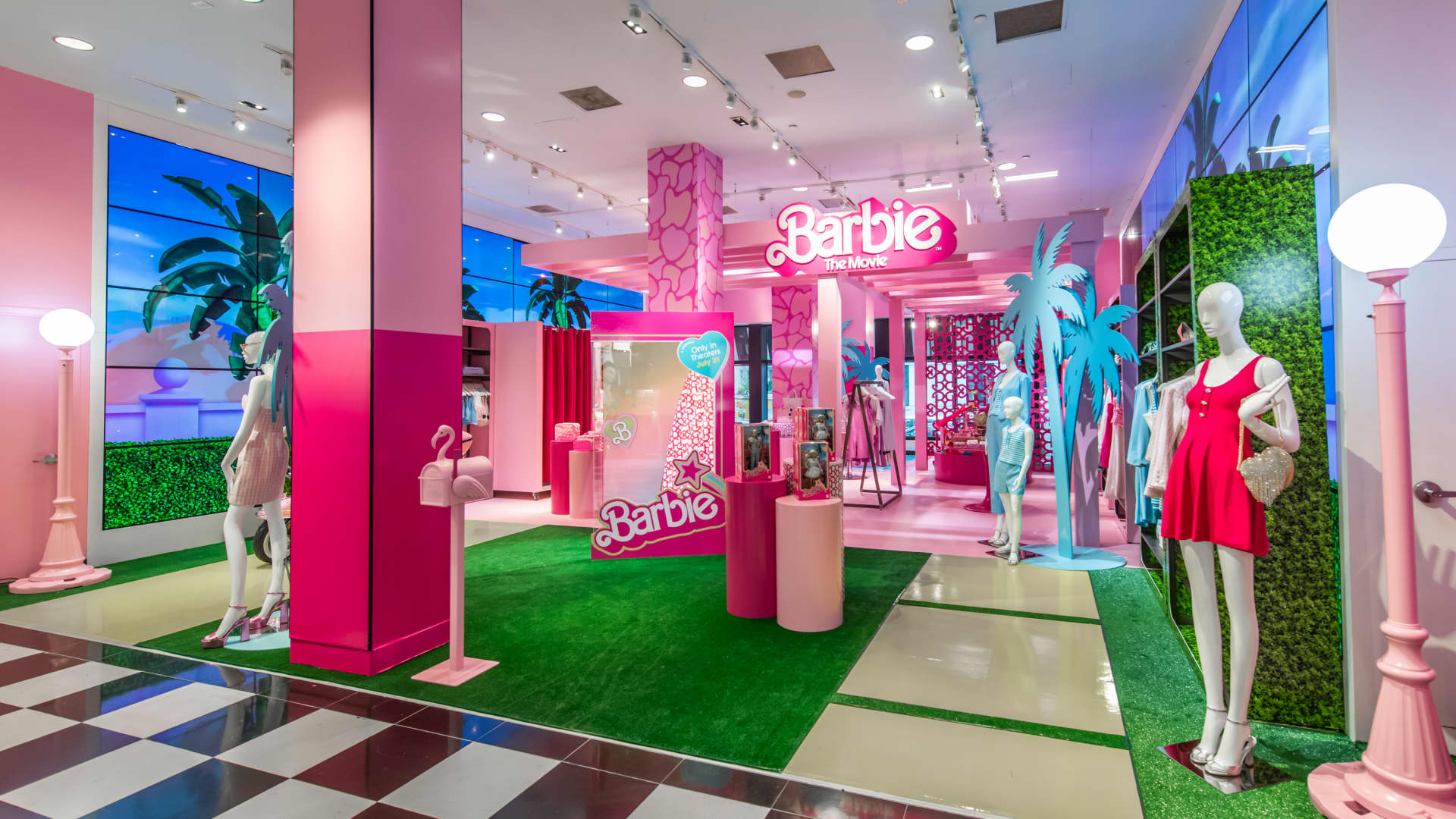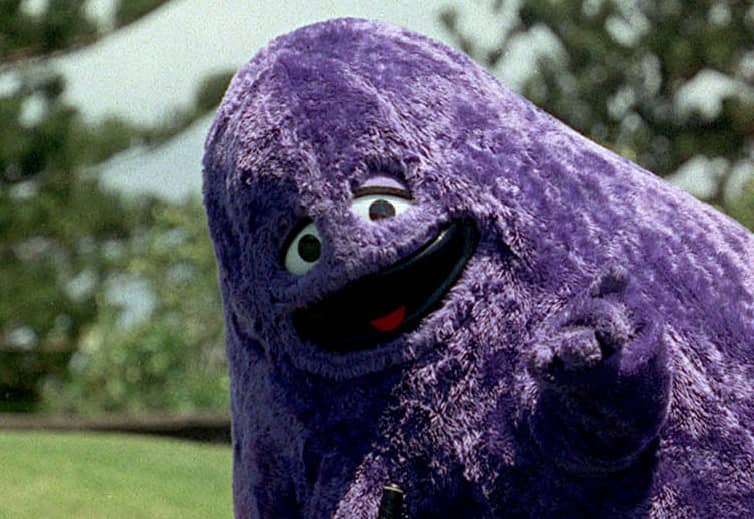NEW YORK CITY — In the middle of Manhattan, shoppers can step inside of a life-sized Barbie box, strike a pose by a hot pink slide and browse earrings, dresses and candles inspired by the iconic plastic doll.
The pop-up shop inside Bloomingdale’s flagship store is just one example of how retailers are trying to cash in on the buzz ahead of the Friday release of “Barbie” from Warner Bros.
related investing news
More than 100 brands, including Bloomingdale’s, Kohl’s, Crocs and Gap, have licensing agreements or other deals with toy maker Mattel to sell Barbie-themed fashion, beauty, accessories and more. Many of those items cater to adults who want to channel childhood memories by donning bright pink heels or lounging on a pool floatie that looks it came out of a Barbie dreamhouse.
Bloomingdale’s has an exclusive collection of Barbie-inspired women’s clothing and accessories for its private label, Aqua. It also hopes to draw shoppers with Barbie-themed window displays on Lexington Ave., special events and complimentary hair styling.
With a splash of hot pink, retailers hope to chase away the summer doldrums and inflation blues. The Barbie merchandise, while hatched months ago in the lead up to the movie, speaks to how retailers have had to work harder and get creative to catch shoppers’ attention and convince them to pay full price. Companies including Bloomingdale’s parent Macy’s, big-box retailer Target and Coach parent Tapestry have warned of weaker sales of discretionary merchandise and big-ticket items in the U.S., as consumers pay more for groceries and spend on services like dining out and traveling.
Plus, millions of Americans have another expense returning this fall: Student loan payments are resuming after a more than three year pandemic-related pause.
Aldo Chief Brand and Product Officer Daianara Grullon Amalfitano said some sparkle and hot pink could help snap shoppers out of a practical, budget-focused mindset.
“This Barbie Aldo collaboration is one of those where maybe that rational thinking just goes out the window and you’re just like, ‘Ah, this makes me feel so happy. So good. I have to have it,'” she said.
About half of Aldo’s Barbie collection sold out in the first week. The company said it’s working on replenishing inventory for the limited-edition collection, which includes 19 items from crossbody bags to pumps.
About half of Aldo’s 317 North American stores carry the line, along with its website. The Aldo products are also available at select Macy’s stores and on Macy’s website.
Macy’s higher-end department store, Bloomingdale’s, carries the Barbie the Movie x Aqua line in nine stores and online, and mixed in merchandise from other brands. So far, the Barbie merchandise is “selling incredibly well” and appealing to customers across generations, said Frank Berman, the department store’s chief marketing officer.
Berman said the retailer intentionally included items across price points in the Barbie-inspired collection, from a $24 pink candle to rose gold heart stud earrings for $8,350.
“We have a few things that are a little over the top, but it’s curated so that everybody can can have a piece of it,” he said.
Many items in Gap’s Barbie collection have sold out. They include rectangular hot pink adult sunglasses and a T-shirt with Ken in big capital pink letters, both $39.95.
Barbie to the rescue?
Barbie may not just jolt a sluggish 2023 box office. The buzz could also lift spending on nonessential items that has dropped after a Covid spending spree.
Retailers will likely have to keep offering unique and trendy merchandise to get shoppers to shell out on wants rather than needs as they gear up for the all-important holiday season.
Discretionary general merchandise sales fell by 4% in dollars in June compared with the year-ago period, according to market researcher Circana, the merged company formerly known as The NPD Group and IRI. Unit sales in the category fell by 9% during that timeframe.
Last week, Amazon, Walmart, Target and others drove sales by offering deeper discounts with Amazon Prime Day and other competing promotions. Consumers spent $12.7 billion during the two-day sales event online in the U.S., representing 6.1% growth year-over-year and marking a new record, according to Adobe Analytics.
Barbie cut through as a popular search item last week. It jumped from 85th to 49th on the list of top brands this Prime Day versus last year, according to early data from Numerator. The top Barbie item sold during the sales event was lead actress Margot Robbie’s “Barbie” collectible doll.
As Americans look for deals, Barbie is just one of the ways that retailers are persuading them to look beyond the essentials.
Oliver Chen, a retail analyst for Cowen, said brands have capitalized on trends like the shift toward looser-fitting denim, the return to dressier and more tailored outfits for occasions and the heightened interest in innovative makeup and skincare products.
“Every brand loves newness because newness creates desire,” said Chen.
Barbie is “another floating life jacket” that retailers can grab onto, said Susan Fournier, a professor of marketing and dean of Boston University’s business school. The brand has built-in recognition, nostalgia that resonates across generations and baked-in free marketing because of the movie.
Unlike other movie-themed merchandise, Barbie isn’t just a logo that can get plastered on T-shirts and backpacks, but an aesthetic that cuts across home goods, makeup and clothing and channels an optimism that many shoppers may crave, she said.
“We’re in a pretty messy world,” she said. “We’re in the post-Covid world, which has a ton of baggage. There’s a ton of anxiety. And then you get Barbie and it’s all pink. And I think there’s something super deep about a hunger for that.”
She said some of the brand’s power comes from its complicated legacy. Barbie is closely linked with perfection, with her tiny waist, beautiful home and handsome boyfriend. Yet Barbie was also unmarried and became an astronaut before the first moon landing.
“There is something culturally powerful about living in that contradictory space,” Fournier said.
Chasing the Barbie bump and beyond
Other retailers have run a similar playbook with branding inspired by pop culture.
Tapestry-owned Coach has collaborated with beloved brands and celebrities, including Disney and comic strip Peanuts. It had a collection of clothing and accessories inspired by Jean-Michel Basquiat, the late New York artist who became famous in the 1980s for his edgy and graffiti-inspired designs. It recently launched a new collection with actress Kirsten Dunst.
Coach CEO Todd Kahn said the company carefully chooses which partnerships make sense. He said he has enjoyed seeing other brands’ Barbie collaborations, but Coach decided against a partnership.
“So often people use collaborations for a quick spike,” he said. “We’re interested in long-term sustainability. That’s why with our collaborations we’ve become very selective on them. We use them to help bring a new audience to the table. And then we measure how sticky they are afterwards, which is super important.”
For example, he said, Coach’s Basquiat items attracted new and more engaged customers, brought in about 10% more Gen Z and millennial customers than its mainline collections and enticed them to pay some of Coach’s highest price points.
Some brands appear to be getting a Barbie bump — but it remains to be seen whether those customers will stick around.
Berman, Bloomingdale’s longtime chief marketing officer, said the chain sees an increase in store and website traffic when it has collaborations. That’s why the company’s flagship has “The Carousel,” a dedicated pop-up space, which can also be shopped online.
The retailer has blended fashion, a well-recognized brand and a memorable experience many times before. It had a pop-up inspired by Netflix’s hit series, “Bridgerton.” Many years ago, it had a “Moulin Rouge”-themed pop-up, complete with can-can dancers and an appearance by the movie’s star, Nicole Kidman.
Aldo’s Amalfitano declined to share recent sales numbers or its forecast for the year. Yet like other retailers, the footwear and accessories brand has felt the pullback in discretionary spending, she said.
She hopes elevated sales and shopper engagement will continue, even when the Barbie merchandise is gone.
“That’s a burning question,” she said.
— CNBC’s Caitlin Freda and Courtney Reagan contributed to this report.



